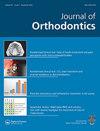Prevalence and nature of bullying in schoolchildren aged 10–14 years and its association with malocclusion: A cross-sectional study in the South East of the UK
IF 1.4
Q3 DENTISTRY, ORAL SURGERY & MEDICINE
引用次数: 0
Abstract
To investigate the prevalence of, and relationship between, bullying and malocclusion in schoolchildren aged 10–14 years in the South East of the UK. Cross-sectional cohort study. Sixteen primary and secondary schools in South East of the UK. Schoolchildren aged 10–14 years who were consented to participate. The prevalence and nature of bullying were measured using a questionnaire. Traits of malocclusion and the need for orthodontic treatment was assessed by clinical examination and determined by the Index of Orthodontic Treatment Need (IOTN) Dental Health (DHC) and Aesthetic components (AC). Complete data were collected for 698 participants. The number defined as being bullied was 68 (9.7%). There was no difference in the prevalence of bullying between gender, ethnicity or age. Higher rates of bullying were reported in mixed sex schools ( P = 0.03). Participants with an increased overjet ( P = 0.02) and/or a greater need for treatment, as measured by IOTN DHC ( P = 0.01) and AC ( P = 0.01), reported higher rates of bullying. While there was no difference in the overall prevalence of bullying between genders, boys were more likely than girls to experience physical bullying ( P <0.001) and being called names ( P = 0.03) A significant relationship was evident between being bullied and certain traits of malocclusion.10-14 岁学龄儿童遭受欺凌的普遍程度和性质及其与错颌畸形的关系:英国东南部地区横断面研究
调查英国东南部 10-14 岁学龄儿童遭受欺凌和牙齿畸形的发生率及其关系。横断面队列研究。英国东南部 16 所中小学。同意参与研究的 10-14 岁学龄儿童。使用调查问卷测量欺凌的发生率和性质。通过临床检查和牙齿矫正治疗需求指数(IOTN)、牙齿健康指数(DHC)和美学指数(AC)评估错颌畸形的特征和牙齿矫正治疗的需求。共收集了 698 名参与者的完整数据。被定义为受欺凌的人数为 68 人(9.7%)。不同性别、种族或年龄的人受欺凌的比例没有差异。男女混合学校的受欺凌率较高(P = 0.03)。根据 IOTN DHC ( P = 0.01) 和 AC ( P = 0.01) 测量,过切牙列增大 ( P = 0.02) 和/或更需要治疗的参与者报告的欺凌发生率更高。虽然不同性别之间的欺凌总体发生率没有差异,但男生比女生更容易遭受身体欺凌(P <0.001)和被辱骂(P = 0.03)。
本文章由计算机程序翻译,如有差异,请以英文原文为准。
求助全文
约1分钟内获得全文
求助全文
来源期刊

Journal of Orthodontics
DENTISTRY, ORAL SURGERY & MEDICINE-
CiteScore
2.60
自引率
15.40%
发文量
55
期刊介绍:
The Journal of Orthodontics has an international circulation, publishing papers from throughout the world. The official journal of the British Orthodontic Society, it aims to publish high quality, evidence-based, clinically orientated or clinically relevant original research papers that will underpin evidence based orthodontic care. It particularly welcomes reports on prospective research into different treatment methods and techniques but also systematic reviews, meta-analyses and studies which will stimulate interest in new developments. Regular features include original papers on clinically relevant topics, clinical case reports, reviews of the orthodontic literature, editorials, book reviews, correspondence and other features of interest to the orthodontic community. The Journal is published in full colour throughout.
 求助内容:
求助内容: 应助结果提醒方式:
应助结果提醒方式:


